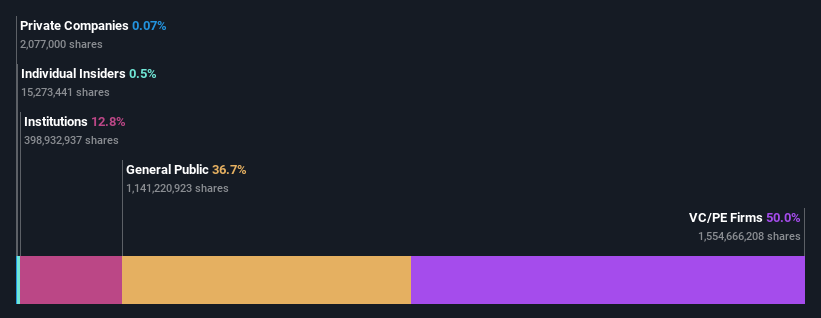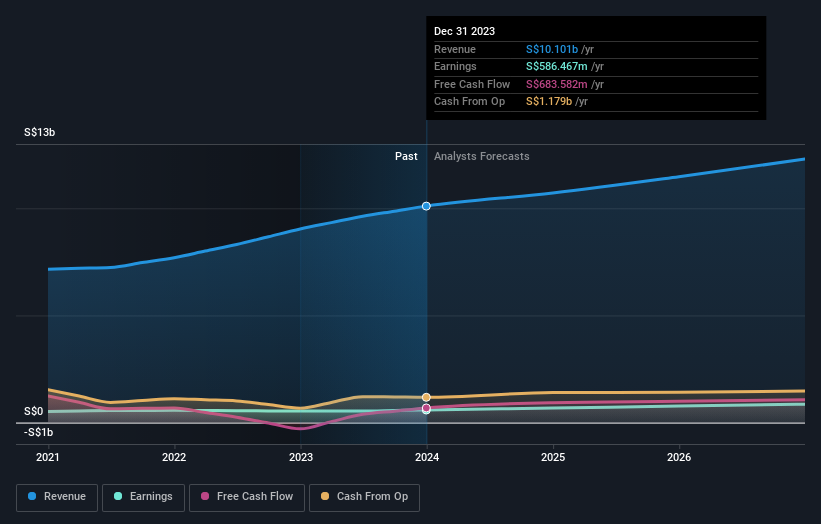- Singapore
- /
- Aerospace & Defense
- /
- SGX:S63
Singapore Technologies Engineering Ltd (SGX:S63) stock most popular amongst private equity firms who own 50%, while individual investors hold 37%

Key Insights
- Singapore Technologies Engineering's significant private equity firms ownership suggests that the key decisions are influenced by shareholders from the larger public
- 52% of the business is held by the top 2 shareholders
- 13% of Singapore Technologies Engineering is held by Institutions
A look at the shareholders of Singapore Technologies Engineering Ltd (SGX:S63) can tell us which group is most powerful. The group holding the most number of shares in the company, around 50% to be precise, is private equity firms. That is, the group stands to benefit the most if the stock rises (or lose the most if there is a downturn).
And individual investors on the other hand have a 37% ownership in the company.
Let's delve deeper into each type of owner of Singapore Technologies Engineering, beginning with the chart below.
See our latest analysis for Singapore Technologies Engineering

What Does The Institutional Ownership Tell Us About Singapore Technologies Engineering?
Many institutions measure their performance against an index that approximates the local market. So they usually pay more attention to companies that are included in major indices.
Singapore Technologies Engineering already has institutions on the share registry. Indeed, they own a respectable stake in the company. This can indicate that the company has a certain degree of credibility in the investment community. However, it is best to be wary of relying on the supposed validation that comes with institutional investors. They too, get it wrong sometimes. If multiple institutions change their view on a stock at the same time, you could see the share price drop fast. It's therefore worth looking at Singapore Technologies Engineering's earnings history below. Of course, the future is what really matters.

Hedge funds don't have many shares in Singapore Technologies Engineering. The company's largest shareholder is Temasek Holdings (Private) Limited, with ownership of 50%. In comparison, the second and third largest shareholders hold about 1.9% and 1.8% of the stock.
After doing some more digging, we found that the top 2 shareholders collectively control more than half of the company's shares, implying that they have considerable power to influence the company's decisions.
While studying institutional ownership for a company can add value to your research, it is also a good practice to research analyst recommendations to get a deeper understand of a stock's expected performance. There are a reasonable number of analysts covering the stock, so it might be useful to find out their aggregate view on the future.
Insider Ownership Of Singapore Technologies Engineering
The definition of an insider can differ slightly between different countries, but members of the board of directors always count. The company management answer to the board and the latter should represent the interests of shareholders. Notably, sometimes top-level managers are on the board themselves.
I generally consider insider ownership to be a good thing. However, on some occasions it makes it more difficult for other shareholders to hold the board accountable for decisions.
Our most recent data indicates that insiders own less than 1% of Singapore Technologies Engineering Ltd. It is a very large company, so it would be surprising to see insiders own a large proportion of the company. Though their holding amounts to less than 1%, we can see that board members collectively own S$60m worth of shares (at current prices). It is good to see board members owning shares, but it might be worth checking if those insiders have been buying.
General Public Ownership
The general public, who are usually individual investors, hold a 37% stake in Singapore Technologies Engineering. While this group can't necessarily call the shots, it can certainly have a real influence on how the company is run.
Private Equity Ownership
With a stake of 50%, private equity firms could influence the Singapore Technologies Engineering board. Sometimes we see private equity stick around for the long term, but generally speaking they have a shorter investment horizon and -- as the name suggests -- don't invest in public companies much. After some time they may look to sell and redeploy capital elsewhere.
Next Steps:
While it is well worth considering the different groups that own a company, there are other factors that are even more important. For instance, we've identified 2 warning signs for Singapore Technologies Engineering (1 is a bit concerning) that you should be aware of.
But ultimately it is the future, not the past, that will determine how well the owners of this business will do. Therefore we think it advisable to take a look at this free report showing whether analysts are predicting a brighter future.
NB: Figures in this article are calculated using data from the last twelve months, which refer to the 12-month period ending on the last date of the month the financial statement is dated. This may not be consistent with full year annual report figures.
New: Manage All Your Stock Portfolios in One Place
We've created the ultimate portfolio companion for stock investors, and it's free.
• Connect an unlimited number of Portfolios and see your total in one currency
• Be alerted to new Warning Signs or Risks via email or mobile
• Track the Fair Value of your stocks
Have feedback on this article? Concerned about the content? Get in touch with us directly. Alternatively, email editorial-team (at) simplywallst.com.
This article by Simply Wall St is general in nature. We provide commentary based on historical data and analyst forecasts only using an unbiased methodology and our articles are not intended to be financial advice. It does not constitute a recommendation to buy or sell any stock, and does not take account of your objectives, or your financial situation. We aim to bring you long-term focused analysis driven by fundamental data. Note that our analysis may not factor in the latest price-sensitive company announcements or qualitative material. Simply Wall St has no position in any stocks mentioned.
About SGX:S63
Singapore Technologies Engineering
Operates as a technology, defence, and engineering company worldwide.
Solid track record, good value and pays a dividend.


